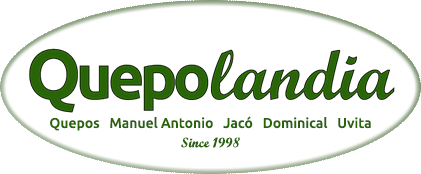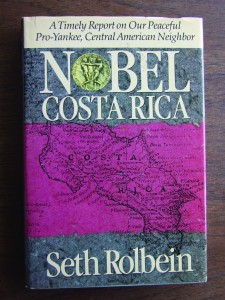Nobel Costa Rica
On December 1, 1987, Oscar Arias had been in office as the elected President of Costa Rica for nearly one full year. The Nobel Prize was awarded to Arias that year as well, but on the first day of December, the announcement had been made but the ceremony had yet to take place. On December 1, 1987, Costa Rica was celebrating its thirty-ninth anniversary of democracy. And this is where Seth Rolbein, a young reporter from the United States, begins his book, “Nobel Costa Rica”.
The initial chapter focuses on the aforementioned day of celebration. It is a symbolic passing of the baton from Don Pepe Figueres, who had actually proclaimed Costa Rica a democratic nation and abolished the Army nearly four decades earlier, to his Arias, his political godson. After the speeches, including one by Cardinal O’Connor, Arias leads the parade of admirers through downtown San Jose. Oscar mingles with the crowd, shaking hands and even stopping nonchalantly to purchase an ice cream to eat as he continues his mile-long stroll among the throng. Jim Wright, then a U.S. congressman and Speaker of the House, comments incredulously to a nearby aide, “How sad it is that we cannot do that in our country anymore. Seeing the President walk out of the church and into that crush of people, then take to the streets is simply remarkable to me”.
Rolbein freezes the scene here, moving on to chapter two, basically a synopsis of the history of Costa Rica, since the arrival of Europeans. Yes, much of the history can be found in other historical guides to Costa Rica. But the author’s perspective and timing are impeccable to put it all in the perspective of this important moment for Arias and his country, that it merits being told. There are also some interesting tidbits; I had not been aware that the first coffee beans were reportedly introduced to Costa Rica in 1808 from Jamaica as a present from a merchant ship’s captain to a local, Caribbean governor. Nor did I know that when Mora returned from thwarting William Walker and his filibusterers, he brought with him cholera, wiping out ten percent of the Costa Rican population.
The author takes the train to Limon, with plenty of descriptive observation, along with his take on the history of the United Fruit Company. I was in awe that he devotes two pages of his book to Manuel Monestel, the Calypsonian, a man I have come to meet and whose music I admire today. Then it is off to Quepos to witness bullfights and the production of Palm Oil, then to Liberia, the capital of Guanacaste, where a television show was being taped in front of a live audience. Rolbien than visits two transplanted farmers from the U.S.: John Hull, a former Air Force pilot, who may or may not have taken bribes from both the Sandinistas and Somoza in exchange for use of his airstrips, and the Quaker group who relocated to Monteverde and started their cheese production there. Again, Rolbein’s timing was impeccable for these two notable events, more than a quarter century ago.
Ultimately, the author returns to San Jose, sees Arias depart for Oslo to receive his Nobel Peace Prize, then has time to pause and reflect, wrap things up as it were. Dated as the work is, I still think it remains pertinent today, well worth the read.


